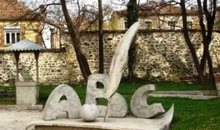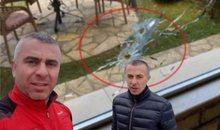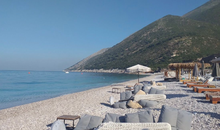
The American obsessed with Albania, a country he would write an anthem for

Bleart Thaçi/ Continental Magazine
In 1974, before an audience that had come to hear his Southern Gothic-themed concept album, Good Old Boys, singer-songwriter Randy Newman made a strange detour. “This,” he said in a wry tone, as he tapped the piano keys, “is an Albanian wedding song. It’s about the sexual frustrations of a young Albanian groom.”
The audience erupted in laughter. Most took it as one of Newman’s signature jokes—dark, strange, perhaps a little surreal. But the song, “A Wedding in Cherokee County,” and the comments that accompanied it, were not just idle banter. They offered a glimpse into one of the most unexpected corners of Newman’s creative imagination: a strange but sincere passion for communist Albania.
Yes, Albania.
Throughout the 1970s and the decades that followed, Randy Newman maintained a strange obsession with Albania — the small, mountainous Balkan country that was at the time one of the most rigid and isolated communist regimes in the world. Under dictator Enver Hoxha, Albania had severed relations with the Soviet Union over its “revisionism” and later with Maoist China, accusing it of lacking ideological orthodoxy. The country became an ideological island, suspicious even of its former allies. To most Americans, Albania was a blank spot on the map, a joke in its own right. But to Newman, it was perfect.
“I follow Albanians, like some people follow the Dodgers,” the Los Angeles-born singer has joked in several interviews. But behind that joke was a real fascination. Decades later, during a concert in Berlin in 1994, he returned to the subject with a kind of lingering admiration: “What I admired about them was their independent foreign policy. They had no allies in the world.” Even North Korea was too right-wing for them.
At one point, he even tried to write an anthem for Albania. A heartfelt anthem. With verses about goatherds and late winter snow, he imagined it as a solemn song for a nation he saw as both tragic and absurd, harsh and somehow heroic in its stubbornness. Of course, the gesture was more symbolic than practical. Western music was banned in communist Albania, and the song, even if it were finished, would never reach Albanian ears. The real audience was American, and the anthem became more a reflection of Albania from afar than an attempt to communicate with it.
Por himni, siç pranoi më vonë vetë Newman, filloi të tingëllonte “shumë si ‘Back Home Again in Indiana’,” çka tregon vetëdijen e tij se kompozimi po rrëshkiste drejt një stili të klishematizuar të muzikës sentimentale amerikane. Kjo këngë, e publikuar më 1917, përshkruan një dëshirë për t’u kthyer në shtëpi, në fushat me aromë lulesh dhe përgjatë lumit vezullues Wabash — një vizion nostalgjik dhe i idealizuar i shtetit të Indianës. Përpjekja e Newman-it për të shkruar një himn për Shqipërinë përfundoi me diçka po aq sentimentale. Në vend që të krijonte një vepër që të shqyrtonte në mënyrë kritike apo autentike nacionalizmin shqiptar, ai u gjend pa dashje duke riprodhuar një stil që mishëronte nostalgjinë dhe ndjeshmërinë amerikane, duke ia shteruar projektit qëllimin fillestar.
Megjithatë, diçka mbeti. Melodia mbijetoi, por skenari ndryshoi: nga malet me dëborë të Shqipërisë në pyjet përvëluese të Alabamës së thellë. Teksti mori një formë tjetër, personazhet ndryshuan; versioni përfundimtar i këngës, i vendosur në Cherokee County, u përshtat plotësisht me pjesën tjetër të këngëve të albumit konceptual me tematikë Southern Gothic. Por për Newman-in, thelbi i “këngës së dasmës shqiptare” origjinale vazhdoi të jetonte.
Në performanca live—në Seattle (1974), Madison (1977) dhe Berlin (1994)—Newman vazhdoi të përmendte origjinën e saj. “Kjo është pjesa shqiptare këtu,” thoshte në mes të performancës, përpara se të këndonte një pjesë solemne, me ton heroik të rremë, për një ujk gri që gjuan në pyll dhe për mënyrën si dashuria e një gruaje i jep forcë burrit të saj.
Gjithmonë shkaktonte të qeshura. Por, si shumë nga krijimet e Newman-it, shakaja ishte me shumë shtresa. Shqipëria e imagjinuar prej tij—toka e ujqërve, barinjve të dhive dhe mallëngjimit nacionalist—nuk pasqyronte realitetin, por një shpikje të ekzagjeruar, lindur nga largësia dhe ideologjia. Gjatë Luftës së Ftohtë, për shumicën e amerikanëve Shqipëria ishte një mister. Izolimi i saj e kishte kthyer në një mit gjeopolitik—njëkohësisht qesharak, frikësues dhe dukshëm i parëndësishëm. Për Newman-in, ajo errësirë ishte perfekte për satirë. Duke përmendur Shqipërinë, ai mund të tallej me mënyrën sesi amerikanët e imagjinonin “tjetrin”—se si kultura të tëra reduktoheshin në karikatura dhe shfrytëzoheshin si zëvendësime në konflikte ideologjike, veçanërisht kultura si ajo shqiptare, ku stalinizmi i ngurtë dhe politika e izolimit e bënin atë të dukej jo vetëm e huaj, por ideologjikisht e pakuptueshme për audiencat amerikane të rritura me mendësinë bardh-e-zi të kohës.
Stili satirik i Newman-it ishte i thjeshtë në dukje, por i mprehtë në thelb. Në albumin Good Old Boys, ai këndon me zërin e racistëve, fanatikëve dhe budallenjve—jo për t’i justifikuar, por për t’i ekspozuar. Albumi kritikon jo vetëm racizmin në Jug, por edhe hipokrizinë në Veri (“Rednecks”); ai glorifikon figura si populisti i vrarë Huey Long (“Kingfish”). Në regjistrimin demo të Good Old Boys, realizuar më 1973, zbulohet se si Newman e kishte imagjinuar himnin shqiptar si pjesë të një projekti satirik që, në pamje të jashtme, nuk dilte kurrë jashtë Jugut Amerikan. Kënga nuk vinte nga Shqipëria, por nga një aparat televiziv i kthyer në një shfaqje varieté. “Dhe tani,” shpall prezantuesi, “Kori i Akademisë Ushtarake West Point do të interpretojë versionin e tyre të himnit kombëtar shqiptar.”
Është një imazh qartësisht absurd—kori i një akademie ushtarake amerikane duke kënduar himnin e një shteti ideologjikisht kundërshtar—shembull klasik i humorit të Newman-it. Fiksimi i tij me Shqipërinë, nëse mund të quhet kështu, ishte një shtrirje ekzotike e konceptit të albumit Southern Gothic. Kënga nuk fliste për Shqipërinë në mënyrë specifike; fliste për mënyrën se si amerikanët krijojnë mite dhe shpesh e keqkuptojnë botën brenda dhe jashtë kufijve të vet.
Vetë Newman-i ka pranuar se nuk dinte shumë për Shqipërinë. Ai blinte gazetat e saj, lexonte për spastrimet e brendshme, por pranonte se pikërisht kapriçot dhe errësira e saj ishin pjesë e tërheqjes. “Kanë një histori vërtet të çmendur, dhe muzikë vërtet të çuditshme,” thoshte ai. Kur nuk arriti dot ta përfundonte himnin, nuk e braktisi absurditetin—vetëm e zhvendosi. Në Good Old Boys, “A Wedding in Cherokee County” e bën përvojën e Jugut të duket po aq e huaj dhe fiksionale sa Shqipëria e imagjinuar prej tij. Dhëndri i Newman-it ka frikë nga ujqërit në pyjet e zbardhura nga agimi dhe mbart jehona pastorale të bariut të dhive—imagjinatë e marrë drejtpërdrejt nga himni i papërfunduar shqiptar. Ankthi i tij për “shpatën e fuqishme”, përmendja e “të gjithë të çuditshmëve” që marrin pjesë në dasmë dhe mënyra ironike me të cilën shqipton betimet plot ndjenjë e kthejnë jetën e përditshme jugore në diçka njëkohësisht rituale dhe të huaj, duke e bërë “lokalen” të ndihet po aq larg sa Ballkani. Si në himnin e braktisur, ashtu edhe në këngën e përfunduar, Newman tallet me mitologjitë që njerëzit ndërtojnë rreth vendeve. Ai tregon se si nacionalizmi dhe identiteti rajonal bazohen në rrëfime të shpikura për pastërtinë, vuajtjen dhe romancën.
In this sense, “A Wedding in Cherokee County” is neither Albanian nor Southern. It is a landscape invented by Newman himself—somewhere between Tirana and Tuscaloosa—where irony and sincerity coexist uncomfortably. It is a place where a sexually insecure groom, afraid that his bride will laugh at him with “his mighty sword,” represents an entire mythologized culture that doesn’t know how to cope with feelings and masculinity, and where the imagined enemy is neither communism nor capitalism, but the over-consumed narratives we use to understand identity, place, and power.
What began as an “Albanian anthem” ends, as Newman himself once called it, at a “low point of rock and roll taste”—but he sings it anyway, seriously, with a poignant compassion.
Despite what it says in live performances, “A Wedding in Cherokee County” is not about Albania. It’s about how we imagine places we don’t understand. It’s about how nationalism, whether Balkan or Southern, often relies on myths that blur the line between pride and parody. And it’s about a singer-songwriter who tries, in a way that’s both sincere and absurd, to make art out of this mess.
Sometimes, historical sources are hidden in the most unexpected places—not in archives or official documents, but in spontaneous jokes on stage, in an obscure song on a concept album, or in the cultural life of an abandoned anthem for a country that never asked for one. Newman’s flirtation with communist Albania did not yield an anthem, but it left behind a significant relic of the Cold War. Following this journey, we are reminded that the sources of historical understanding are not always grand or conventional. Sometimes they come wrapped in absurdity, in half-finished songs, or in jokes thrown thoughtlessly from a piano bench. And in this sense, Newman’s so-called “Albanian wedding song” is not simply a cultural curiosity. It is a case study in how humor, music, and imagination can become unexpected gateways to the past—a reminder that even the strangest cultural relics can offer insights into the time in which they were born.
*Bleart Thaçi is a master's student in the Department of History at the University of Pristina, Kosovo. He is also an intern at Reporting House, a historical museum dedicated to the war in Kosovo.
Latest news




Hail and strong storm "grab" Belshi
2025-06-20 17:35:56

School closures increase parents' financial burden during the summer
2025-06-20 16:49:19
KAS dismisses SP over vote revaluation
2025-06-20 16:34:02



Albanian language included in official communications of New York public schools
2025-06-20 15:08:35
Accident in Italy, 46-year-old Albanian dies (NAME)
2025-06-20 14:50:50
Kosovo in electricity crisis, KESCO appeals to citizens: Save electricity!
2025-06-20 14:29:55
Meta: Disinformation against me, a product of government propaganda!
2025-06-20 14:08:44
The American obsessed with Albania, a country he would write an anthem for
2025-06-20 13:39:41
Berisha: SPAK is throwing candy to protect Gys Agas and Rama!
2025-06-20 13:30:02
"Elections an electoral crime"/ Berisha warns of protests at home and abroad
2025-06-20 13:09:59


Reported missing a day ago, elderly man found dead in Peqin
2025-06-20 12:19:21
Drug gangs in Tirana cracked down, 24 arrested, 8 wanted (NAMES)
2025-06-20 11:57:38


You win the elections like Edi Rama - but justice won't allow you in Switzerland
2025-06-20 11:10:28
Bullets fired at Arjan Ndoji's former driver's bar, 15 shells at the scene
2025-06-20 10:48:02
Vokshi reports Vilma Nushi to SPAK, files lawsuit for "Check Up"
2025-06-20 10:31:54
Requests release from prison, hearing for former president Meta ends today
2025-06-20 10:15:50

Bullets fired at a bar in Fushë Krujë, police surround the area
2025-06-20 09:34:34



Foreign exchange, how much foreign currencies are bought and sold today
2025-06-20 08:40:20

Clear skies and cloudy skies, today's weather forecast
2025-06-20 08:00:26
Morning Post/ In 2 lines: What mattered yesterday in Albania
2025-06-20 07:50:05
Noka reveals Rama's condition for Veliaj to resign
2025-06-19 22:53:43
Vote recount in Tirana, Kaso: We did not have the 14th mandate as our objective
2025-06-19 22:44:53




Noka: Policemen were running from morning to night for SP votes
2025-06-19 21:31:03
The three zodiac signs that will be disappointed in love this month
2025-06-19 21:18:48
Accused of murder due to blood feud, 48-year-old arrested in England
2025-06-19 21:06:57
Vasili releases video: Tirana-Kashar segment full of gravel, no workers around!
2025-06-19 21:00:48

Tirana without a coach, four names considered for the white-and-blue bench
2025-06-19 20:21:12

Rinderpest/ A new outbreak appears in Shkodra, 200 sheep affected
2025-06-19 20:01:50

Scientists raise the alarm: Earth risks exceeding the 1.5°C warming limit!
2025-06-19 19:37:44

"Fiscal Peace" without consultation with the EU, Brussels concerned
2025-06-19 19:05:23
Trump signs executive order extending TikTok ban in US for another three months
2025-06-19 19:03:35

A special Task Force on immigration is established in cooperation with Italy
2025-06-19 18:23:58
Drug trafficking gang busted in Italy, 25 people arrested, including Albanians
2025-06-19 18:18:33
AMF denounces a suspicious cryptocurrency investment platform
2025-06-19 18:06:07


Technology as a tool of war between Israel and Iran
2025-06-19 17:27:54




EU divided over Israel's right to bomb Iran
2025-06-19 16:10:42

Analysis/ How is Russia spreading propaganda in the Albanian language?
2025-06-19 15:49:18
Session in the Criminal Court, MP Qani Xhafa is fined
2025-06-19 15:33:30
Members of criminal organizations! 3 Albanians extradited from Dubai today
2025-06-19 15:20:04

Lufta/ Zelenskyy bën thirrje për rritjen e presionit ndaj Rusisë
2025-06-19 14:56:02

Netanyahu warns Iran after attacks on Israeli hospital
2025-06-19 14:34:53

Attempted to enter Albania with false documents, 25-year-old arrested
2025-06-19 14:18:20
Psychology explains what happens in the brain of a person contemplating suicide
2025-06-19 14:01:25

These are the coldest zodiac signs
2025-06-19 13:45:18



Albanian man dies in hospital after accident in Italy
2025-06-19 13:02:45


Berisha to gather political leaders tomorrow
2025-06-19 12:32:23

Iran confirms meeting with representatives of Britain, Germany and France
2025-06-19 12:11:33


The constitution of the Kosovo Assembly fails for the 34th time
2025-06-19 11:30:28


Albania's nuclear bomb!
2025-06-19 10:52:02

Prej 4 ditësh e zhdukur, humb gjurmët adoleshentja shqiptare në Greqi
2025-06-19 10:33:11
Choosing a child's name, expert reveals three key factors
2025-06-19 10:29:17

